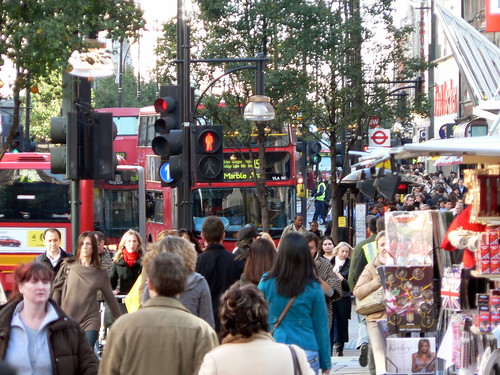Christmas shopping
By Peter Carter.
In today’s podcast, we have a serious discussion of the state of the world economy, and we go Christmas shopping with Kevin and Joanne.
As I am sure you know, there are some big problems in the world’s economy at present. There is a recession (that is, a reduction in output) in many countries, including Britain. The problem is that banks in America, and in Britain and some other countries, lent money to people who could not afford to repay. So many banks are in big trouble, and have stopped lending to anyone. So people have less money to spend, and many have lost their jobs. And the big shops are cutting their prices because they are worried that people are not buying. And governments have had to intervene, to do things, some of which are useful and some of which are not useful. That is Listen to English’s summary of the world’s economic problems. You can use it in your economics homework if you wish.
December is the biggest shopping month of the year in Britain, as it is in many countries. People want to buy Christmas presents for their friends and family, and nice things for themselves as well. As a result, the shops are full of people. But perhaps this year is different. Because of the recession, maybe the big stores and the out-of-town shopping centres are deserted. Perhaps this year, for once, it will be possible to go Christmas shopping in peace. Wrong. Things are as bad as ever.
Kevin and Joanne went Christmas shopping last Saturday afternoon. They needed to buy a present for Kevin’s aunt Joan, who is 73 years old. “A cardigan,” said Kevin. “Old ladies always like a new cardigan.” So they agreed, they would buy Aunt Joan a new cardigan.
“Good,” said Kevin. “I am glad that we have decided what to buy her. So is it alright if you buy the cardigan and I go with George to the football match”.
They took the bus into the centre of town. There were crowds of people everywhere – people going to and fro; people going in and out of shops; people getting on and off buses; people getting into and out of taxis. Every now and then, there was a gap in the crowds, and Kevin and Joanne made their way carefully down the street to Marks and Spencer. Marks and Spencer is, as I am sure you know, a well-known British store which sells mainly clothes, including cardigans of the sort which 73 year old aunts like to get for Christmas.
Kevin and Joanne looked for a cafe. They were all full. Several had a queue of people waiting outside. Then Joanne remembered that there was a cafe at the art gallery. The art gallery was empty. Perhaps people are not interested in culture at Christmas. Kevin, who had never actually been there before, looked around with interest. “That painting is upside down,” he said in a loud voice as they went through the modern art section. “And that one is sideways.” “Kevin, “ said Joanne. “The people in the art gallery know which way to hang their paintings and you don’t. Now shut up and stop making an idiot of yourself.”
There were only a few people in the cafe at the back of the gallery. Kevin and Joanne drank tea, and ate a slice of cake each. They talked about how difficult it was to do shopping when there were so many people. “You know,” said Kevin. “It is better at a football match. There aren’t as many people, and they are not so aggressive.”
Download MP3 (5:44min, 3MB)
Vocabulary Note
Look at these expressions and check in a dictionary. Then try the quiz bellow.
- to and fro
- in and out
- on and off
- now and then
- round and round
- up and down
- backwards and forwards
- from side to side
- upside down
- inside out
- back to front
- there and back












